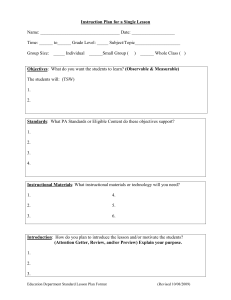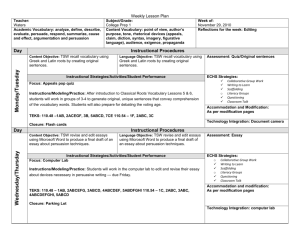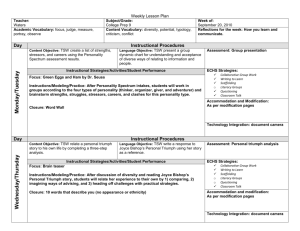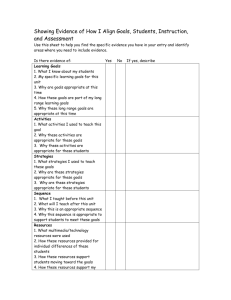Weekly Lesson Plan 8 - Wayne County School District
advertisement
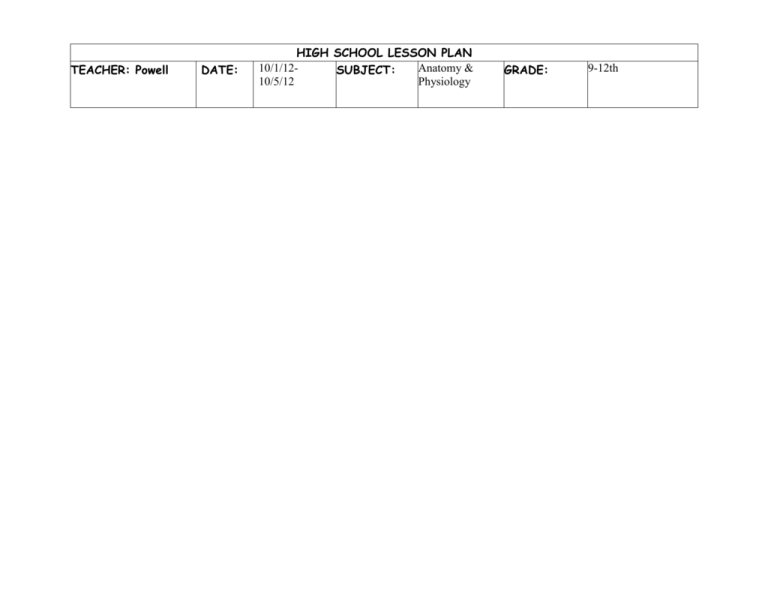
TEACHER: Powell DATE: HIGH SCHOOL LESSON PLAN 10/1/12Anatomy & SUBJECT: 10/5/12 Physiology GRADE: 9-12th MS FRAMEWORKS COMPETENCY/UNIT GOAL: WEBB’S DOK LEVEL: 3. Demonstrate an understanding of the structure, functions, and relationships of the body systems. c. Compare the structure and functions of the skeletal system with its relationship to movement. (DOK 1) Structures which comprise bone Difference between endochondrial and intramembranous ossification Major bones of the axial and appendicular skeleton, noting inherent differences between males and females Types of joints and their movements ATTACH UNIT/FORMAL ASSESSMENT: DAILY OBJECTIVE W/DOK: MUST BE MEASUREABLE MONDAY GLN from ppt. TSW: Identify the subdivisions of the skeleton as axial or appendicular. GLN from ppt. TSW: List at least 3 functions of the skeletal system. GLN from ppt. TSW: Name the 4 main classifications of bones. GLN from ppt. TSW: Identify the major anatomical areas of a long bone. TUESDAY GLN from ppt. TSW: Explain the role of bone salts and the organic matrix in making bone both hard and flexible. GLN from ppt. TSW: Describe briefly the process of bone formation in the fetus, and summarize the events of bone remodeling throughout life. GLN from ppt. TSW: Name and describe 6 types of fractures. WEDNESDAY THURSDAY FRIDAY Giving diagram TSW GLN from ppt. TSW GLN from ppt. TSW identify and name the Explain how the name the 3 major bones of the skull. abnormal spinal categories of joints, curvatures (scoliosis, and compare the GLN from ppt. TSW lordosis, and amount of movement name the parts of a kyphosis) differ from allowed by each. typical vertebra and one another. explain in general how GLN from ppt. TSW the cervical, thoracic, GLN from ppt. TSW identify some of the and lumbar vertebrae identify on a causes of bone and differ from one skeleton/diagram the joint problems another. bones of the shoulder throughout life. and pelvic girdles GLN from ppt. TSW and their attached discuss the importance limbs. of the intervetebral discs and spinal GLN from ppt. TSW curvatures. Describe important differences between a male and female pelvis. BELL RINGER: SET: 1. Est. Obj. 2. Restate Obj. 3. Involve Learner What happen once in a minute, twice in a moment, but never in a thousand years? Ans: Letter M (Brain Teaser) ____________ Instructional strategy used: #5 Discuss what bones of the human body interest the students the most ____________ Instructional strategy used: #9 Identify the difference b/w the axial and appendicular skeletons and list 3 bones located in each. Explain the characteristics of the “shaft of a Long Bone”. What are the major List the four types of bone cells classifications of and their bones and give an functions? example of each. ________________ Instructional strategy used: #5 ______________ Instructional strategy used: #5 _____________ Instructional strategy used: #5 Use diagram of the long bone. Discuss how paralysis Allow students to occurs. discuss breaks or fractures of bone by giving their story. _______________ Instructional strategy used: # 9,4 ______________ Instructional strategy used: #9 _____________ Instructional strategy used: #9 ______________ Instructional strategy used: #5 Divide students into groups and have them answer note worksheet. ______________ Instructional strategy used: #9 T2O: 1. Explanations 2. Directions 3. Activities 4. Questioning 5. Responding TTW: TTW: Review material the student covered in class during the previous class meeting. Review material the student covered in class during the previous class meeting. Provide notes that will be given using Microsoft PowerPoint Presentation technology. Give students handouts of a blank skeleton and vocabulary words. TSW: Complete skeleton handout by coloring bones of axial skeleton (red) appendicular (blue) Take Notes from ppt. and keep in notebook ____________ Instructional strategy used: # 2,9,5 TTW: TTW: Review material the Review material the student covered in student covered in class during the class during the previous class meeting. previous class meeting. Provide notes that will Provide notes that will be given using be given using Provide notes that Microsoft PowerPoint Microsoft PowerPoint will be given using Presentation Presentation Microsoft technology. technology. PowerPoint Presentation Give students handouts technology. of a blank long bone TSW: and vocabulary words. Take Notes from ppt. Give students handouts of a blank and keep in notebook skeleton and TSW: vocabulary words. Take Notes from ppt. Pop Quiz on human and keep in notebook Complete diagram of long bone. T-Read pg. 134-140 answer 1-4 ________________ Instructional strategy used: # 2,5,9 TTW: Review material the student covered in class during the previous class meeting. Provide notes that will be given using Microsoft PowerPoint Presentation technology. Give students handouts of a blank skeleton and vocabulary words. TSW: Take Notes from ppt. and keep in notebook skeleton and class TSW: notes. Take Notes from ppt. *Comparing Concepts and keep in notebook Binder Check Handout *Trace Diagram of Axial vs. Appendicular Skeleton on Posterboard & Color ______________ ______________ Instructional Quiz Instructional strategy used: ____________ strategy used: Instructional # 2,9 # 2,5,9 strategy used: # 2,5,9 DIFFERENTIATED INSTRUCTION LEVEL 1 LEVEL 2 LEVEL 3 CLOSURE: 1. SUMMRAIZE 2. INVOLVE LEARNER 3. CHECK UNDERSTANDING EVIDENCE OF LEARNING: ASSESSMENT OR HOMEWORK: Q&A Q&A Q&A ________________ Instructional strategy used: #9 _______________ Instructional strategy used: #9 ____________ Instructional strategy used: #9 Verbal Discussion Diagram Pop Quiz Verbal Discussion Verbal Discussion Instructional strategy used: # Instructional strategy used: # Instructional Strategy used: # Instructional Instructional Strategy used: Strategy used: # # ____________ Instructional strategy used: #9 Q&A Q&A ______________ Instructional strategy used: #9 ADJUSTMENTS MADE: Marzano’s Essential 9 High Leverage LARRY BELL’S 12 MOST POWERFUL WORDS: Instructional Strategies: www.middleweb.com/MWLresources/marzchat1.html (if you need a refresher) 1. Identifying similarities and differences from beginning 2. Summarizing and note taking 3. Reinforcing effort and providing recognition it down, 4. Homework and practice 5. Nonlinguistic representations lines, guess from 6. Cooperative learning do you know 7. Setting objectives and providing feedback 8. Generating and testing hypotheses 9. Cues, questions, and, advanced organizers create jc-schools.net/12powerfulwords/12powerfulwords.ppt (for the power point) trace: follow, outline, show me the steps, go over, to end, think back through time analyze: take apart, break into parts & explain, break explain parts, tell the good & bad infer: guess in an educated way, read between the the context, what do you think it means, what that’s not written there evaluate: judge, give me your opinion, give it a grade formulate: come up with, develop, build, show process, describe: tell me about it, give me the details, in your own words, tell in detail, tell me who, what, when, where, how, & why support: give reasons, defend your answer, back it up about it explain: tell me more stuff, what does it mean, tell me all summarize: tell me the important stuff, narrow down, what’s the point, put it in your own words, give me the important stuff compare: show likeness, same, all the ways they are the same contrast: show differences, all the ways they are different predict: what happens next, what do you think will happen, tell future, look into your crystal ball
